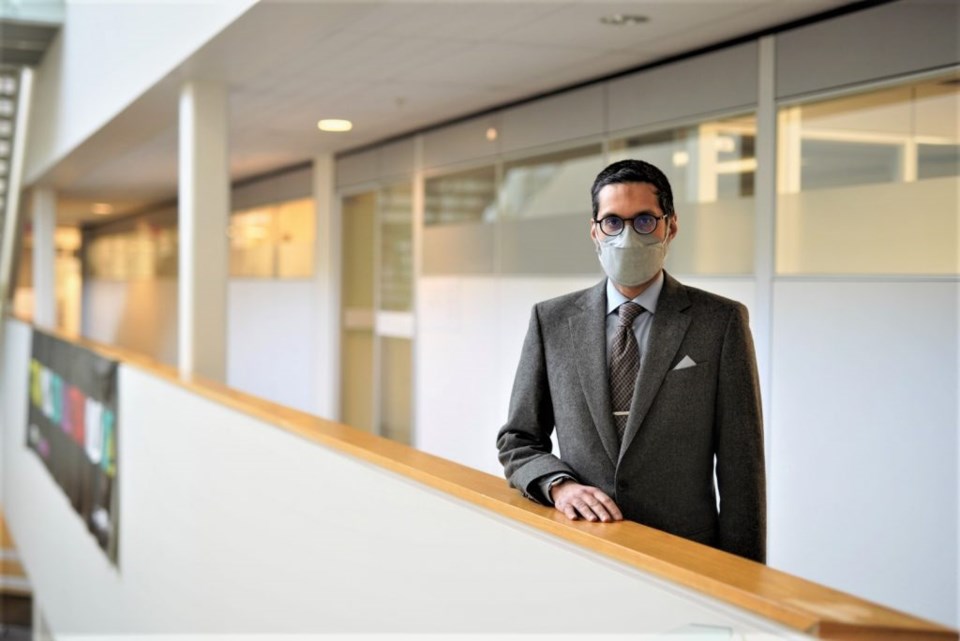
With a possible spike in COVID cases still possible as a result of last week’s long weekend, Dr. Mustafa Hirji, Niagara’s acting chief medical officer of health, is concerned about the pressure on hospitals.
The number of infections at this stage is heading upwards, and could plateau, or continue to rise, he said.
“We may be hitting the peak, but the data doesn’t show that. Hospitals are seeing an upward trend province-wide.”
The provincial science table is indicating hospitalizations could exceed the numbers during the omicron wave, he said.
With Niagara hospitals at about 107 per cent capacity, up from 102 per cent two weeks ago, Hirji said, “I don’t know how much more our hospitals will be able to weather that storm.”
In the last seven days, one to two people were hospitalized per day with COVID, and the number of acute care beds that are occupied is rising, he said during his Monday media update.
The problem is two-fold, with Niagara hospitals also dealing with staff shortages, and had more than 300 staff off last week either because they themselves were sick, or were at home isolating because a family member is infected with COVID.
They’re struggling with beds and workers, said Hirji, and the way to solve that problem “is by controlling this pandemic.”
In response to the over-capacity of Niagara hospitals, Niagara Health is ramping down its surgical program to 70 per cent, due to growing pressures from patient volumes and staff and physician illness.
This measure will allow Niagara Health to use these beds to care for COVID-19 positive patients and other patients with urgent needs, a media release says, and adjusts operations to ensure Niagara hospitals can provide emergency, critical and acute care to patients using available resources.
“We will use the same decision-making framework that we have used in previous waves to assess each case, understanding that emergency, urgent and oncology patient surgeries will take priority,” says Linda Boich, one of the hospital system’s executive vice-presidents, and executive lead for integrated care.
“Surgeons and the scheduling office will reach out directly to patients who are impacted by surgical postponements to rebook the procedures at the earliest opportunity. We recognize the challenges this places on patients and families and apologize for the inconvenience and stress this may cause,” says Boich.
Niagara Health has been working to catch up on the surgical backlog created during earlier COVID waves, says a Monday news release. “It is very unfortunate that we must ramp down surgeries again, knowing how important it is for patients to receive safe, quality surgical care on a timely basis. However, the ramp down is a necessary measure given the urgent need to address the current and anticipated pressures from this sixth wave.”
“This is part of a stepped approach to respond to capacity and staffing pressures and ensure we are prepared for heightened activity in the coming weeks,” the release says.
“We are not yet seeing peak activity related to this wave in the hospital,” says Dr. Johan Viljoen, chief of staff. “Hospitals across our region and beyond are facing similar pressures, which have led to the postponement of non-emergency procedures and temporary closures of emergency departments and urgent care centres. Our leaders are continuously evaluating our resources and recommending further actions as required. It is important that we support our team members who are impacted by COVID-19, either by illness or their extraordinary efforts to support operations.”
Given the heightened pressures on emergency departments, Niagara Health is asking patients to consider their healthcare options before visiting the hospital for non-emergency concerns. In non-emergency situations, patients are encouraged to reach out to their primary care provider first, or make an appointment with Virtual Urgent Care at www.UrgentCareOntario.ca.
With the state of local hospitals, the number of people still being hospitalized and dying, and increased chronic illness due to long COVID, “it’s not time to return to life as it was in 2019,” Hirji said.
He supports Dr. Kieran Moore’s Section 22 directive to extend mask mandates in high-risk settings until June 11, including on public transit and in long-term care and health care settings.
“It’s a really positive move,” he said. “Absolutely the right decision has been made.”
He continues to hope mask mandates will return in schools and work places, and while he could enact a Section 22 to that effect in Niagara, he says he is still looking to the province for consistent mask rulings.
“I also think this is not the last wave, and we really should have a province-wide mask mandate.”